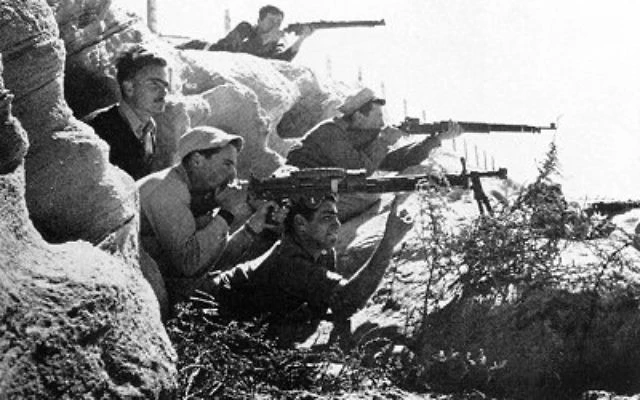1937 was a jittery year in Palestinian history. The Arab Revolt was gaining traction. Mandatory Palestine was receiving an influx of Jewish immigrants from Europe, bringing with them Zionist troublemakers trained by European paramilitaries like Betar and the Jewish Legion. These trained immigrants swelled the ranks of local Zionist terror groups, including the Irgun and Haganah.
The Italian Army, under Signor Mussolini, had conquered Adis Ababa (Ethiopian Capital) earlier in 1936, destabilising the entire horn of Africa including the British Somaliland. The Italians massacred the helpless Ethiopians (no different than Britain in Imperial India), forcing Britain to call out Italy’s use of airstrikes and chemical weapons on civilians a transgression, ruthless slaughter, and colonialism (the same Britain supports both crimes today by Zionist Israel in Palestine). Spain was reeling from a civil war supported by Germany and Italy, while the United States re-elected Roosevelt for a second term.
Colonial Britain started 1937 with a strong stance against the colonial ambitions of Italy; so robust was Colonial Britain’s new policy against European colonialism that King George VI’s letter on January 1st, 1937, was printed in all British colonies including…
- Imperial India
- Burma
- Singapore
- Jordan
- Nigeria
- Aden
- Belize
- Sri Lanka
- Palestine
- Hong Kong
- Kenya
- Bahamas
- Gambia
- Bermuda
- Fiji
- Malaya
…. and many many more, calling for the Empire’s support to the crown after abdication of King Edward VIII. Talk about a lack of self-awareness.
The foundations of the Second World War were being laid, and Zionist terrorists saw an opportunity to conduct bombings, mass killings, and assassinations to claim historically Arab-controlled lands as their own. This trend of colonising Al-Quds (Jerusalem) was exemplified by Rehavia Quarters, created in 1925 as a garden suburb for Jewish immigrants, which was overtaken by four- and five-story flat blocks to accommodate an unsustainably imported Jewish population.
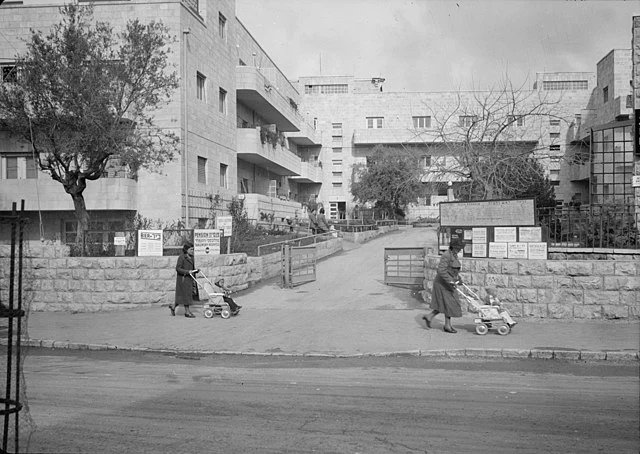
Zionist Terror Attacks in 1937
To preface what is to be a series (a blog for each following year) of expository insights, I would like to present this little nugget of shameless deception from David Ben-Gurion, the Zionist leader and First Prime Minister of Israel, as chairman of the Jewish Agency in 1937.
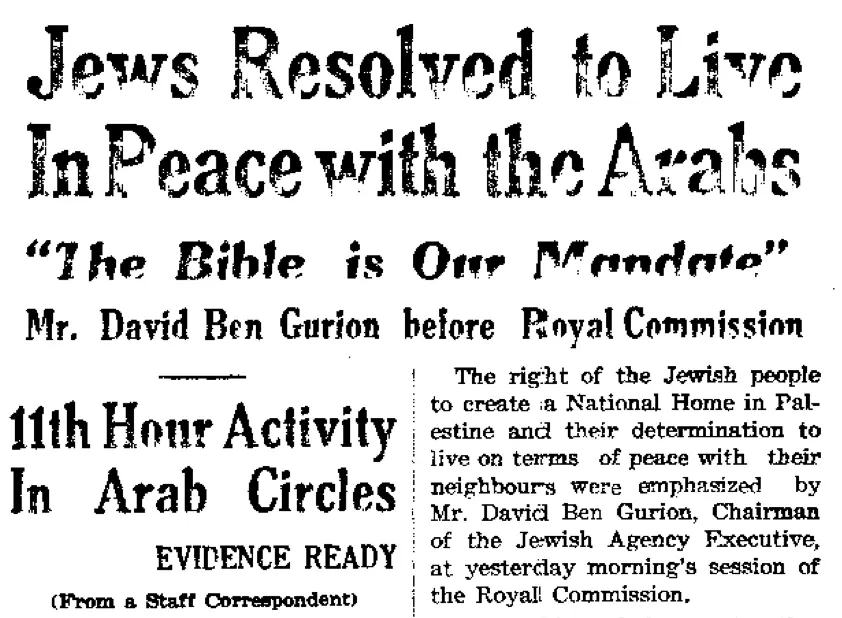
January 1937 started with an uptick of terror attacks against Arab leaders, politicians, and community notables.
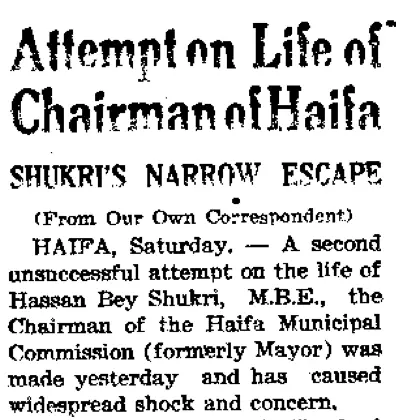
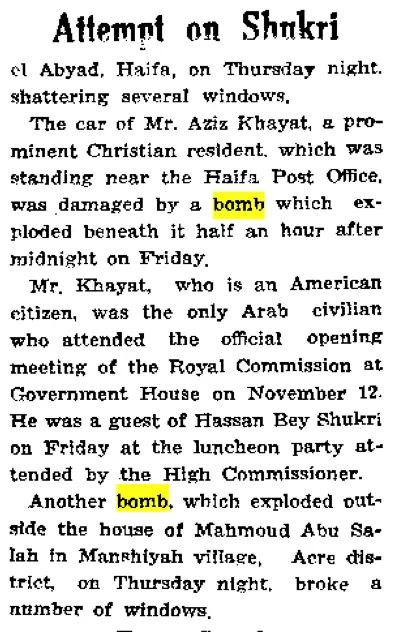
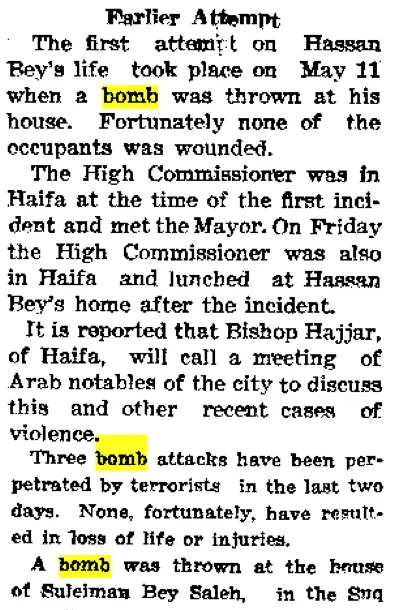
January was not a peaceful month for the Arab citizenry, as another bomb exploded in the Abdul Masih cabaret, a prominent cabaret in the Arab Quarters of Jaffa.
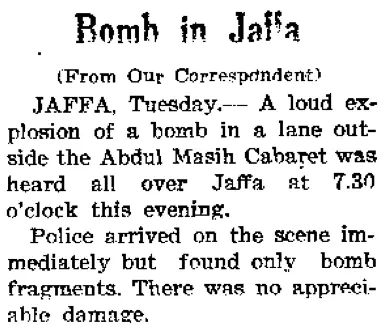
Barely a week after the bombings in Haifa, a prominent Arab physician and nationalist leader was assassinated in Haifa (along with a bystander) in a point-blank execution that shook the local community.
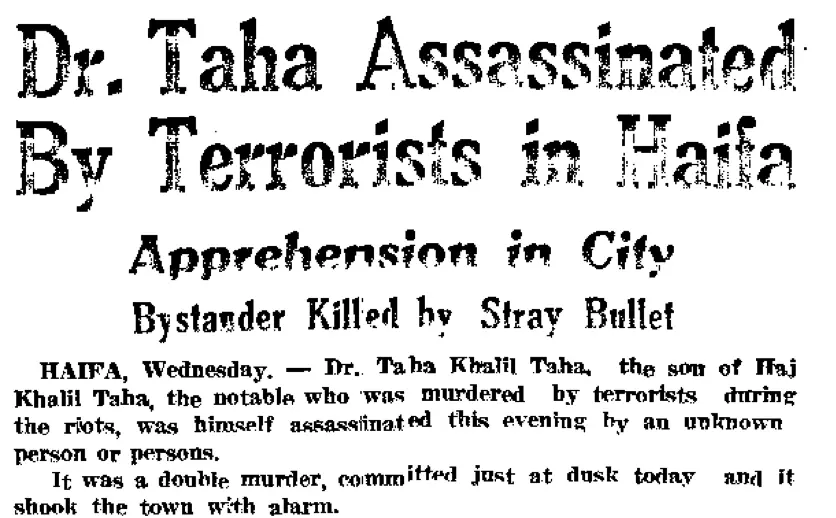
The following publications for 29th and 30th January were filled with sombre opinions of local Arabs, expressing a growing discontent in communities.
“As each fresh outrage occurs at the hands of the terrorist gang which quite evidently has not been dispersed, we ask, is it the last? Whose turn will come next? How ironic, and yet characteristic of the situation, that the brutal murder of Dr. Taha took place on the very day when the authorities in Haifa assured an Arab delegation unit that it need not be apprehensive about public security…
… For clearly, there is some organization behind this terror. Individual Arabs have received warnings that unless they act in a certain way their lives will be forfeit.”
A community reflection published on the 29th January, 1937 edition of the Palestine Post. There are repeated mentions of a ‘Secret Society’ of terrorists.
The terror of assassinations that had begun in January could not subside in February, as another prominent Arab politician fell victim to an assassination attempt on the very first day.
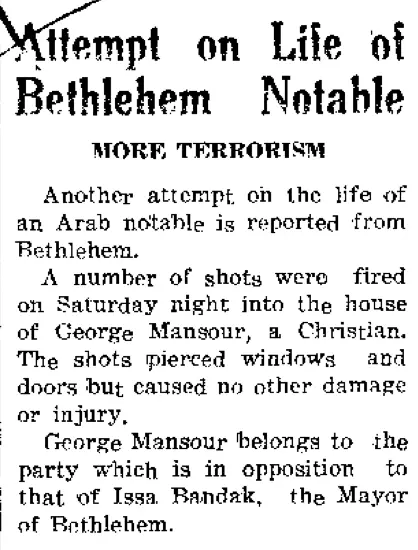
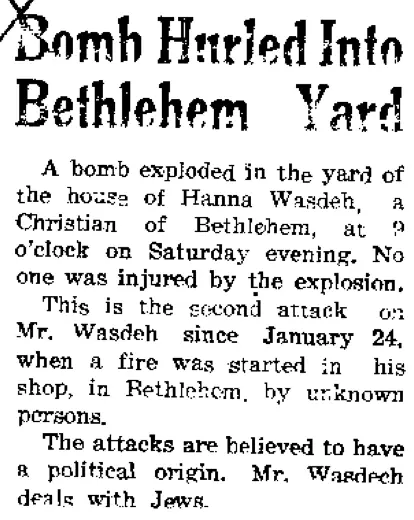
Only a week later, another prominent Arab was targeted with a bomb attack. This particular Arab routinely dealt with Jewish clients, and the local police titled this attack to have a political background.
A week later, fifteen Arab Muslims and Christians were threatened with death in a pamphlet dropped at the Nazareth Mosque on February 14, 1937. The next day, a pipe bomb was thrown into the home of another Arab local in Haifa (February 15, 1937). A few days later (February 19, 1937) a bomb struck the Haifa Municipality building. On February 23, both an Arab policeman and a Jewish settler were murdered. On February 27, 1937, a Jewish synagogue in Haifa was bombed.
March began with terror attacks again, this time attacking the house of a Jewish local (March 1, 1937). On March 8, there were reports of Arabian bomb-makers being injured by the premature explosion of their own bombs. On March 11, 1937, a raid on a Jewish farm led to a settler being injured.
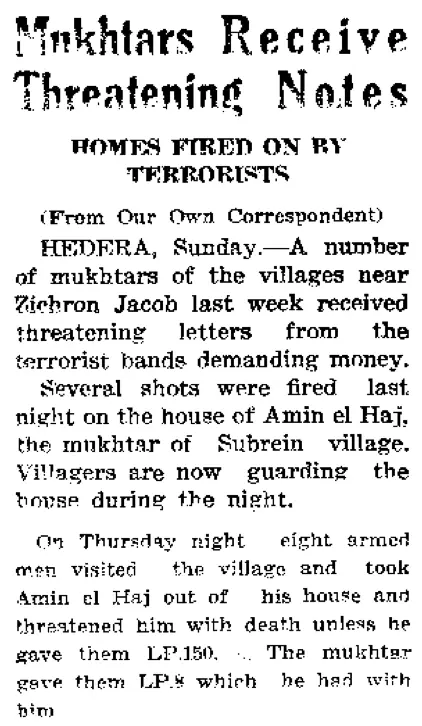
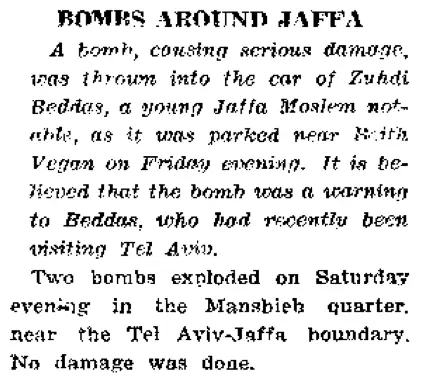
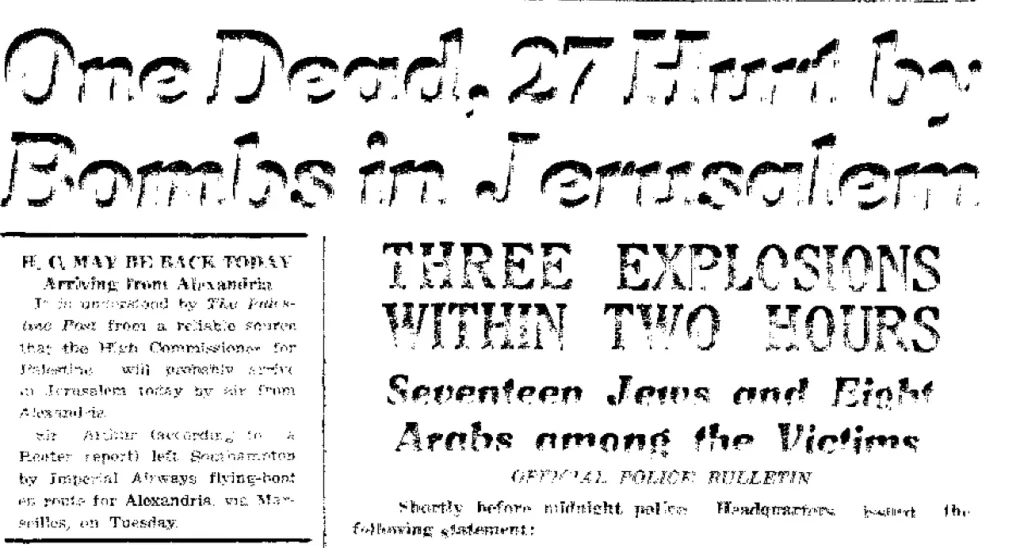
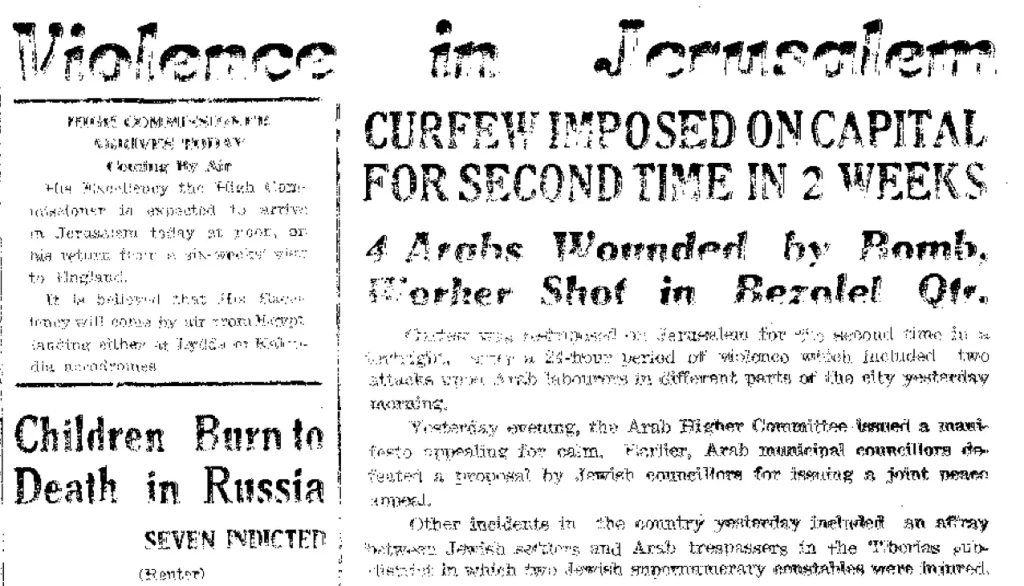
In the following days, the news discusses the recovery of several Arab locals who had bombs thrown in their cars (21 March). Another Arabian cafe was bombed days later.
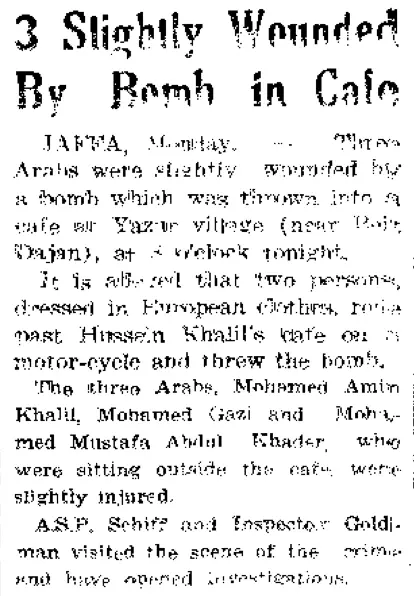
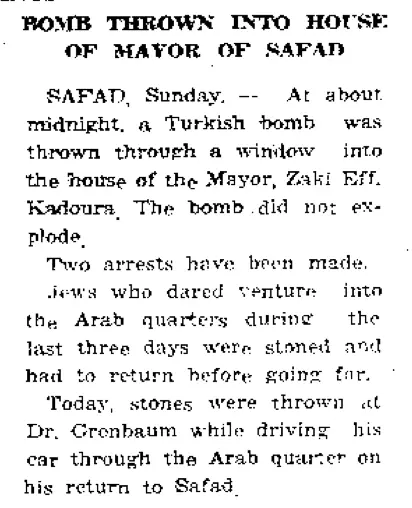
April 1937 brought no relief from a continuing wave of terrorism from both Zionist and Arab fighters, targeting both innocent locals and Jewish immigrants. On April 15, 1937, Arab terrorists shot and killed a senior police officer in Haifa. April 22 saw another home-bombing of a local Arab.
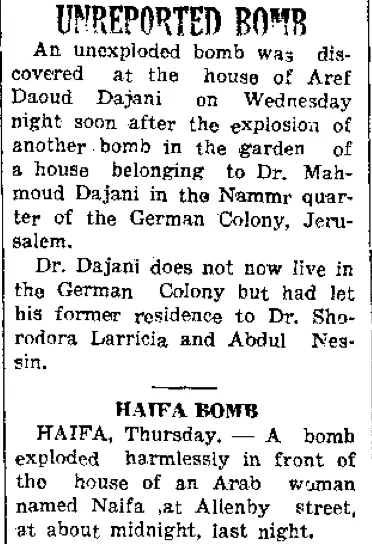
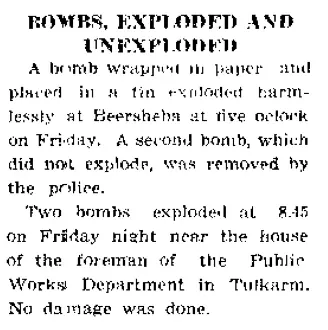
The frequencies of attacks on Arab communities seemed to decrease in summer months, besides the occasional reports of bombs targeting homes in Haifa and Jaffa. On June 2, 1937, a bomb exploded in the Bab Al-Hutta quarter (Arabian quarters) that led to no injuries. On June 3, 1937, a bomb was thrown into a Jewish bus that did not explode. On July 3, 1937, the home of an Arab politician was bombed in Old Jerusalem, while witnessses saw an Arab throw grenades near the Warshavsky hotel.
On July 18, 1937, another Arab home was bombed in Haifa’s Wadi Salib Quarters. A larger stockpile of 15 bombs was found planted in the Wadi Rushmieh Quarters, targeting Arab locals. From August to November, a ‘status quo’ was maintained where bombs would often hit various Arab quarters in Palestine.
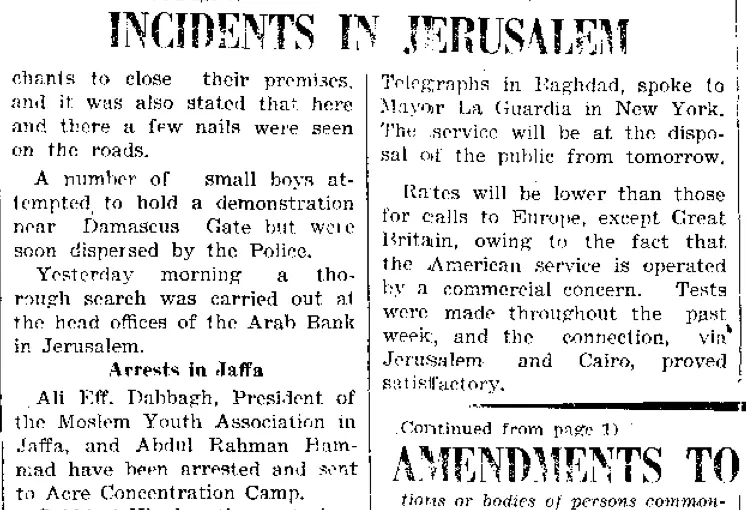
Zionist Hypocrisy
As you may have noticed this far, the ‘Palestine Post’ is a pro-Zionist media source, even to the admission of the National Library of Israel. The paper amplified voices of anti-Arab Zionists, who frequented articles and opinions on how oppressed and victimised the Jews are, and how Arabs are terrorists (I do not need to source the edition, you’ll find them in every other daily print), disregarding the evidence (so far) that most bomb attacks happened in Arab quarters involving Arab victims.
Curiously, accounts from Irgun and other Zionist terror groups from the same time pinpoint how often bomb attacks and shootings were used against Arabs. I believe that the Palestine Post ‘changed’ the narrative of these attacks. If a Zionist or non-Arab was witnessed as the attacker, the person’s description would be omitted. Meanwhile, all events where Arabs were witnessed as the attacking side were promptly reported.
This Zionist hypocrisy came to the forefront after a gang of Zionist settlers were killed on November 9, 1937 by Arab resistance fighters. It should be noted that Zionist Settlers, even in 2024, are known for violent attacks on Arabs, including burning Arab children alive. On August 15, 2024, Israeli Settlers attacked an Arab village, where they burnt homes and cars, shot bullets, and fired tear gas that led to the death of a 23-year-old Arab.

The direct attack on Zionist settler regime enraged the Zionist militias, who perpetrated terror attacks on Arabs in retaliation (‘Black Sunday’). The headline for the next day reads:

Already frustrated with the preceding months of routine bombings and killings in the Arab Quarters, the Arab communities demanded action from the local government against unchecked Zionist terror on the streets. This prompted a rare action against Zionist dissidents who were witnessed attacking local Arabs.
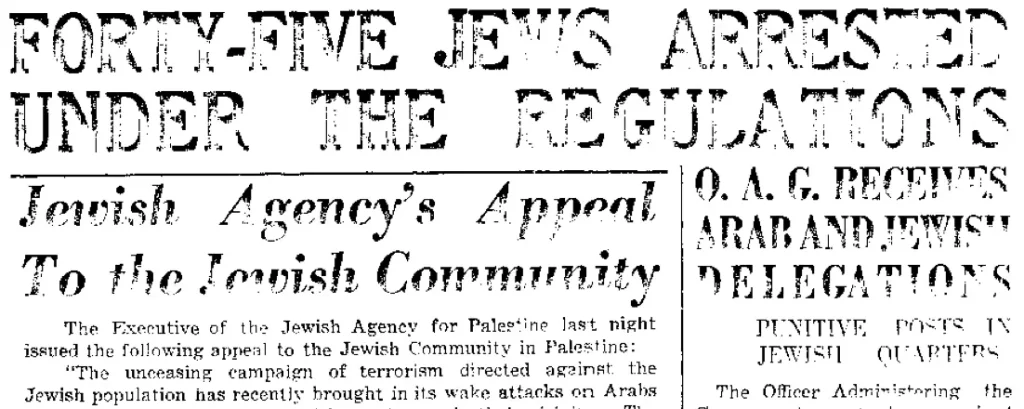
Takeaway
While tensions between Zionist terror groups and local Arab fighters rose in 1937, the year can still be considered relatively ‘peaceful’ compared to the later years, where Irgun and Lehi massively stepped up attacks on Arabs. Zionist Terror Attacks for the Year 1938 will be followed in coming blogs (all the way up to 1948)
A popular strategy for Zionist groups was to bomb crowded Arab food markets in both Haifa and Al-Quds (Jerusalem), often incurring hundreds of casualties, as explored in another blog. This post is the first of a new series in the Fish & Chips blog that explores Zionist terrorism in Mandatory Palestine.
Support me from $3/mo
The West kills millions of innocents and children, and then calls their corpses ‘terrorists’. Their media hides the evidence.
I’m an investigative journalist who digs out that evidence. Get exclusive interviews, podcasts, and credible reports you won’t find elsewhere.
Support independent, grassroots journalism
